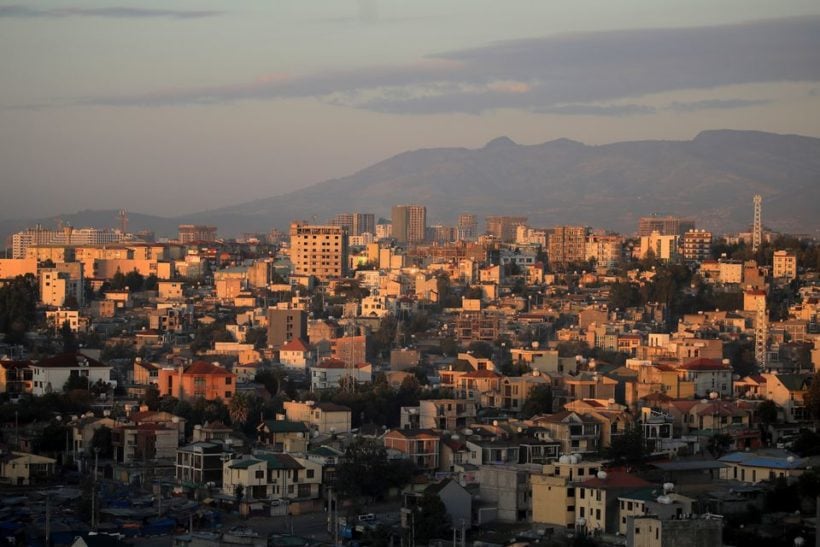
NAIROBI, Nov 5 (Reuters) – Nine anti-government factions are forming an alliance to push for a political transition in Ethiopia, two of the groups said on Friday, piling more pressure on Prime Minister Abiy Ahmed as rebel forces advance towards the capital.
Several of the factions have armed fighters although it was not clear whether they all do.
Two of them, the Oromo Liberation Army (OLA) and the Agaw Democratic Movement (ADM), confirmed the move to Reuters. The pact will be signed in Washington later on Friday.
Called the United Front of Ethiopian Federalist and Confederalist Forces, the alliance includes the Tigray People’s Liberation Front (TPLF), which has been fighting Abiy’s government for a year in a war that has killed thousands of people and forced more than two million more from their homes.
Read more: Ethiopia declares state of emergency as Tigrayan forces gain ground
The front is being formed “to reverse the harmful effects of the Abiy Ahmed rule on the peoples of Ethiopia and beyond,” the groups said, and “in recognition of the great need to collaborate and join forces towards a safe transition.”
Abiy’s spokesperson, Billene Seyoum, asked for reaction to the development, referred Reuters to a comment she posted on Twitter in which she defended Abiy’s rule since he took office in 2018.
She said in the post that the opening of political space after Abiy took office provided ample opportunity for the opposition to settle their differences at the ballot box. Abiy’s party was re-elected in June. She did not refer directly to the new alliance.
Spokespeople for the government and foreign ministry did not respond to requests for comment on the alliance. TPLF spokesperson Getachew Reda also did not respond on Friday.
CEASEFIRE CALLS
African and Western nations have called for an immediate ceasefire in Ethiopia after Tigrayan forces from the north said they had moved closer to Addis Ababa this week.
“The conflict in Ethiopia must come to an end,” U.S. Secretary of State Antony Blinken said on Thursday.
The spokespeople for the Ethiopian government and the TPLF did not respond to requests for comment on Blinken’s call. But on Thursday, the government’s communication department said in a statement: “This is not a Country that Crumbles under Foreign Propaganda! We are fighting an existential war!”
Prior to the new alliance announcement, the OLA had already joined with the Tigrayan forces. The two groups confirmed to Reuters they are in the town of Kemise in Amhara state, 325 km (200 miles) from the capital.
On Thursday the government accused the Tigrayan forces of exaggerating their territorial gains.
The TPLF had said on Tuesday its forces were closing in on the town of Mille, which would enable them to cut off the highway linking neighbouring Djibouti to Addis Ababa.
Read more: Ethiopia names new Tigray head as conflict boils
On Friday, government spokesperson Legesse Tulu rejected the claim, saying fighting was 80 km (50 miles) from Mille. He had not responded to earlier requests for comment.
He also said there was fighting at least 100 km (60 miles) north of Shewa Robit, a town in the Amhara region that is located on the A2 highway, another highway running to Addis Ababa. That would put fighting about 57 km (36 miles) south of Kombulcha, one of two towns that the TPLF said it captured last weekend.
The government said on Friday that a TPLF commander, Colonel Guesh Gebrehiwot, was captured on Thursday during fighting near Dessie, in Amhara. The TPLF was unreachable for comment.
At a market in the outskirts of Addis Ababa, traders were going about their business as usual on Friday but fewer people were coming to shop.
Abdisa Wili, 32, a vegetable seller, said prices were going up.
“If the war is going to continue, it will have impact on the economy,” he said.
“Both sides should stop the war, no one will profit from war except death and economic downfall. They should solve the problem through discussion.”
NEW SANCTIONS BILL
Amnesty International said on Friday there has been an alarming rise in social media posts advocating violence. The rights group also said the state of emergency declared by the government on Tuesday is overly broad and is “a blueprint for escalating human rights violations”.
On Thursday, U.S special envoy Jeffrey Feltman met African Union Commission Chairperson Moussa Faki, as well as the Ethiopian defence minister, finance minister and deputy prime minister, according to the State Department.
It was not clear whether he would meet Abiy during his two-day visit.
The conflict started a year ago when forces loyal to the TPLF, including some soldiers, seized military bases in Tigray. In response, Abiy sent more troops to the northern region.
The TPLF had dominated national politics for nearly three decades but lost much influence when Abiy took office in 2018.
The TPLF accused him of centralising power at the expense of regional states. Abiy denies this.
(Additional reporting by George Obulutsa in Nairobi; Writing by Maggie Fick; Editing by Angus MacSwan)

